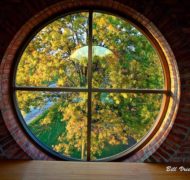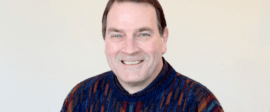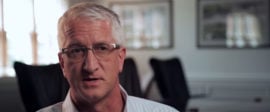God Calls Us to Be Leaders Wherever We Are
Blog / Produced by The High Calling
My wife Debra and I were sitting on a park bench overlooking a small lake. We were having our morning coffee and talking about the day ahead—the ordinary stuff of life. When our two daughters' names came up, Debra suddenly paused and got a faraway look in her eyes.
After a long silence she said: "My job description as I've known it as a mother for the last twenty years is coming to an end. Soon I'll no longer be able to bury my face in the smell of their soft morning wake-up hair. I won't be running last-minute things up to the school anymore. They won't come bounding in the door, full of life, at the end of the day. The defining priorities of my life as a 'mom' will end. My world is about to be redefined. I don't know what my new job description is going to be."
Then with a tear in her eye she said, "There's a loss in that."
Together we sat in the silence of the morning sun, the wind on the water, the trees stirring in the breeze. Debra had just named our new reality as empty nesters. In its own strange way, that moment became a sacred moment. Something holy happened. In an ordinary conversation on an ordinary morning, we suddenly felt the presence of God.
The story is about calling and vocation. It's about the extraordinary breaking into the ordinary. It's about hearing and responding to the call of God in our lives.
In Exodus 3, Moses was herding ordinary sheep on an ordinary day in the wilderness of Sinai. There was a bush—an ordinary, scrubby bush. Suddenly the holy happened. Everything was transformed. Nothing in Moses' life was ever the same again.
Calling, vocation, purpose is often revealed through our own experience of the call of God. It is always a sacred or holy moment, no matter how small.
When the Holy Happens
When we experience God's presence, or God speaks to us, all is transformed. He tells Moses, "Come no closer! Remove the sandals from your feet, for the place on which you are standing is holy ground" (Exo. 3:5).
God's holiness requires respectful distance, but God's presence also transforms everything at hand. The burning bush in the barren, lonely desert of Sinai is a sign that God often comes and graces the lowly. He appears in the common places of life.
We can experience God's presence anywhere, anytime, at work, school, home. God's presence happens to ordinary people going about their ordinary routines. So it's important to be watching and listening for those moments. It is the only way to avoid the common disconnect between our faith and our daily life and work.
The words of Frederick Buechner come to mind:
"Taking your children to school and kissing your wife goodbye. Eating lunch with a friend. Trying to do a decent day's work. Hearing the rain patter against the window. There is no event so commonplace but that God is present within it, always hiddenly, always leaving you room to recognize him or not to recognize him, but all the more fascinatingly because of that, all the more compellingly and hauntingly. . . . Listen to your life. See it for the fathomless mystery that it is. In the boredom and pain of it, no less than in the excitement and gladness—touch, taste, smell your way to the holy and hidden heart of it—because in the last analysis, all moments are key moments, and life itself is grace" (Now and Then, Harper & Row, 1983, p. 87).
God Calls Us
God does call Moses to a specific task. He says, "I have seen the suffering of my people in Egypt; I have heard their cry; and I have come down to deliver them. . . . So come, I will send you to Pharaoh to bring my people out of Egypt" (Exo. 3:7-8, 10). There is work to be done.
The specific tasks of our work are part of our calling and vocation. Martin Luther saw all means of livelihood and productive work—even the most mundane and unpleasant labor—as marks of Christian vocation and response to God. John Calvin said that all our actions, not just our work, are a response to God's calling. Taken seriously, this means that our work and all we do in daily life are our vocation. All work given us by God is therefore holy and is done as a service to God.
In our day, Parker Palmer has spoken of the importance of listening inwardly for the call of God: "Vocation does not come from willfulness. It comes from listening. . . . Vocation does not mean a goal that I pursue. It means a calling that I hear. . . . It comes from a voice 'in here' calling me to be the person I was born to be, to fulfill the original selfhood given me at birth by God" (Let Your Life Speak, Jossey-Bass 2000, pp. 4, 10).
The story of Moses invites us to take off our shoes and listen for the voice of God's call, God's guidance, and reassurance. God told Moses, "So come, I will send you to bring my people out of Egypt."
What is your calling, your vocation? What is the work to which God calls you? Are you living out your calling?
It is helpful to think in terms of your various callings in your work, relationships, leisure, family, and community. In his book, Vocation: Discerning Our Callings in Life, Douglas Schuurman distinguishes the primary calling of all Christians to love God and neighbor, from the multiple particular callings in which we carry out the command to love.
Are you living out your callings in your different roles in life?
But Who Am I?
Moses' initial response to God was, "Who am I that I should go to Pharaoh, and bring the Israelites out of Egypt?" (Exo. 3:11). What a human moment! The call was overwhelming and filled with risk. Moses felt fearful and inadequate. He was reluctant to go.
Don't we all feel that way at one time or another? Just as it isn't always easy to hear God's call in our lives, it isn't easy to live out our call. But we don't have to do it on our own, nor can we.
God tells Moses, "I will be with you" (v. 12). While in the remainder of the story Moses offered further objections to the divine call, eventually he goes. God's "I will be with you" sustained him from the mud-pits of Egypt all the way to Mt. Nebo.
The story of God's call in Moses' life invites us to reflect on our own calling and vocation. Our work and all we do in daily life are a response to God's call. We discern our calling and vocation by listening for God, and we are promised God's presence as we live our call daily.
That same promise of divine presence gives us hope in our journeys. Created, redeemed, and called by God, we also are given the assurance of God's presence and power every step of the way. And that makes all the difference.
Questions for personal reflection, online discussion, or small groups:
- Have you ever had a "burning bush" experience? Recall a time in your life when you felt God's presence in a strong way.
- What is your calling, your vocation? What is the work to which God calls you? Are you living out your calling?
- We all wear several hats. Are you living out your callings in your different roles in life?










